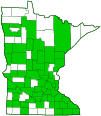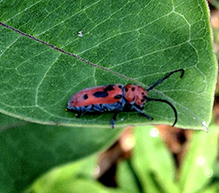red milkweed beetle
(Tetraopes tetrophthalmus)
Conservation • Description • Habitat • Ecology • Distribution • Taxonomy
|
|
||||||||||||||
Description |
Red milkweed beetle is one of three eastern milkweed longhorn beetles. The female is 5 ⁄16″ to ⅝″ long, slightly larger than the male. The body is robust and has broad shoulders. The head, the plate covering the first segment of the thorax (pronotum), and the hardened wing covers (elytra) are red. The face is nearly flat. The antennae are ½″ to ⅝″ long, about as long as the body. They are all black, not ringed with white or gray. The red base of the antennae is inserted into the black eye, splitting the eye into two parts. Two segmented feeler-like structures (palpi) are attached to the lower jaw-like structures (maxillae). The last segment of each maxillary palp is pointed. The pronotum has four small black spots and a raised, disk-shaped hump. Each elytron has five black spots: one in the shoulder region (humerus); a small spot at the base of the elytron near the scutellum; a small antemedial spot neat the suture; a large medial spot near the center; and a small post medial spot near the center. The legs, including the third segments (femurs), are all black. The forward, middle, and back legs each have 5 end segments (tarsi). They appear as 4 segments because the minute fourth segment is concealed by the enlarged thirrd segment. |
Size |
Total length: 5 ⁄16″ to ⅝″ |
Similar Species |
Red-femured milkweed borer (Tetraopes femoratus), as its name suggests, has red femurs. The antennae are ringed with white. The medial black spots on the elytra are no larger than other spots or are absent. It feeds exclusively on showy milkweed. |
Habitat and Hosts |
Meadows, fields, prairies, roadsides. Anywhere the host plants are found. Milkweeds (Asclepias spp,) |
Ecology |
Season |
May to September |
Behavior |
|
Life Cycle |
Adults emerge in May or later, coinciding with the flowering of common milkweed. In early summer the female lays eggs near the base of a common milkweed stem. When the larvae hatch they bore into the stem. They overwinter in the roots. |
Larva Food |
Roots of common milkweed and possibly one or more other milkweed species. |
Adult Food |
Leaves and buds of common milkweed and possibly one or more other milkweed species. |
Distribution |
||
|
Sources |
|
| 8/3/2025 | ||
Occurrence |
||
Common |
||
Taxonomy |
|
Order |
Coleoptera (Beetles) |
Suborder |
Polyphaga (Water, Rove, Scarab, Long-horned, Leaf, and Snout Beetles) |
Infraorder |
Cucujiformia |
Superfamily |
Chrysomeloidea (leaf beetles and allies) |
Family |
Cerambycidae (longhorn beetles) |
Subfamily |
Lamiinae (flat-faced longhorn beetles) |
Tribe |
Tetraopini |
Genus |
Tetraopes (milkweed longhorn beetles) |
Subordinate Taxa |
|
|
|
Synonyms |
|
Cerambyx tetrophthalmus Cerambyx tornator Lamia 13-punctata Lamia fornator Lamia tornator Tetraopes humeralis Tetraopes tetrophthalma Tetraopes tetrophthalmus iowensis Tetraopes tetropthalmus Tetraopes tetropthalmus iowensis Tetraopes tornator Tetraopes tredecimpunctatus |
|
Common Names |
|
eastern milkweed longhorn beetle red milkweed beetle |
|
Glossary
Elytra
The hardened or leathery forewings of beetles used to protect the fragile hindwings, which are used for flying. Singular: elytron.
Femur
On insects and arachnids, the third, largest, most robust segment of the leg, coming immediately before the tibia. On humans, the thigh bone.
Pronotum
The exoskeletal plate on the upper side of the first segment of the thorax of an insect.
Scutellum
The exoskeletal plate covering the rearward (posterior) part of the middle segment of the thorax in some insects. In Coleoptera, Hemiptera, and Homoptera, the dorsal, often triangular plate behind the pronotum and between the bases of the front wings. In Diptera, the exoskeletal plate between the abdomen and the thorax.
Tarsus
The last two to five sections of an insect’s leg, attached to the tibia; the foot.
Visitor Photos |
||
Share your photo of this insect. |
||
This button not working for you? |
||
Luciearl |
||
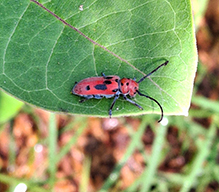 |
||
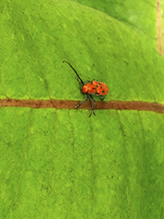 |
||
| Beetle on milkweed. |
|
|
Cynthia Starkweather-Nelson |
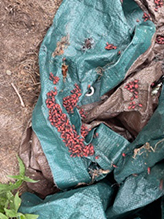 |
Greg Watson |
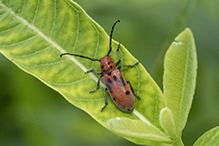 |
Christin Congdon |
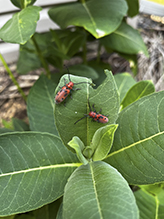 |
Nearest major Cross roads Garden View Drive and Whitney |
Nanc |
||
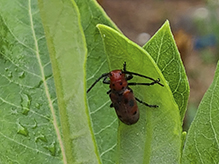 |
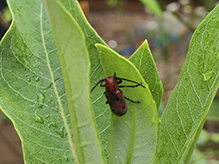 |
|
Susan Gangl |
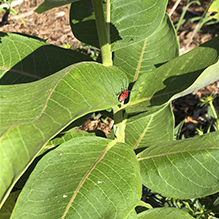 |
Alfredo Colon |
||
Red milkweed beetle, Tetraopes tetrophthalmus |
||
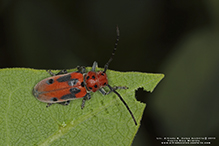 |
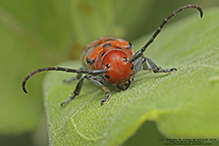 |
|
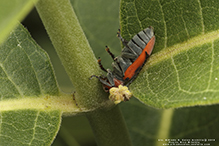 |
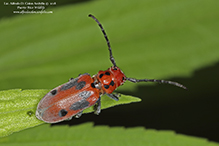 |
|
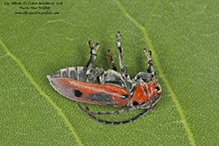 |
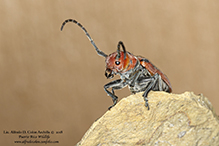 |
|
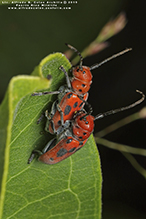 |
||
Paula Rabine |
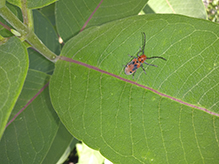 |
Loving our milkweed! |
Lucy Morrissey |
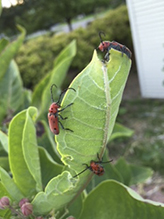 |
Bill Reynolds |
||
Red Milkweed Beetle crawling all over the Milkweed today. |
||
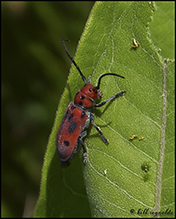 |
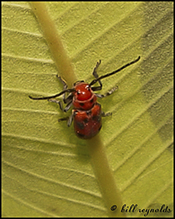 |
|
MinnesotaSeasons.com Photos |
||
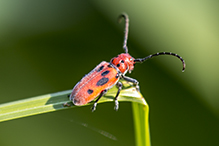 |
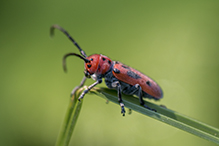 |
|
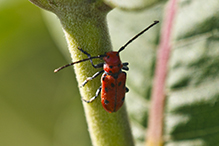 |
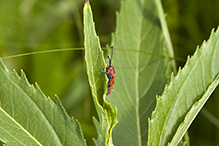 |
|
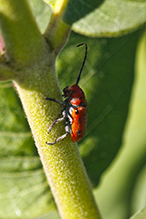 |

Slideshows |
Red Milkweed Beetle |
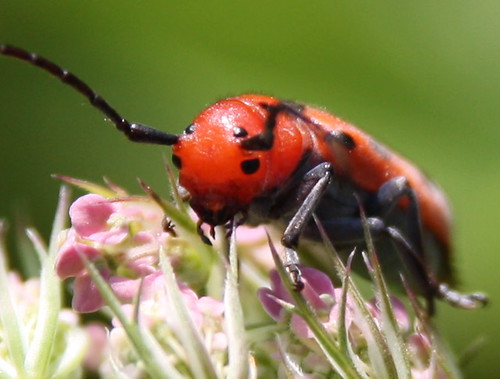
|
About
Copyright DianesDigitals |
Red Milkweed Beetle |
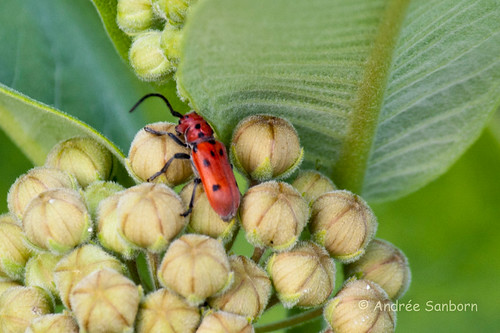
|
About
Tetraopes tetrophthalmus |

Visitor Videos |
||
Share your video of this insect. |
||
This button not working for you? |
||
|
Other Videos |
||
Milkweed Beetle |
About
Published on Jul 6, 2013 Tetraopes tetrophthalmus, commonly known as the red milkweed beetle, is a beetle in the family Cerambycidae. The binomial genus and species names are both derived from the Latin for "four eyes." As in many longhorn beetles, the antennae are situated very near the eye - in the red milkweed beetle, this adaptation has been carried to an extreme: the antennal base actually bisects the eye The milkweed beetle, a herbivore, is given this name because they are generally host specific to milkweed plants (genus Asclepias). It is thought the beetle and its early instars derive a measure of protection from predators by incorporating toxins from the plant into their bodies, thereby becoming distasteful, much as the Monarch butterfly and its larvae do. The red and black coloring are aposematic, advertising the beetles' inedibility. There are many milkweed-eating species of insect that use the toxins contained in the plant as a chemical defense. |
Mating milkweed beetles in the morning, moist |
About
Uploaded on Jul 24, 2011 The red milkweed beetle, Tetraopes tetrophthalmus (Coleoptera; Cerambycidae) is a common herbivore on milkweed (Asclepias). Note how the antennal base bisects the eye (a trait referred to by both the genus and specific epithet,meaning "four eyes"). Here a pair of them enjoy a summer morning on July 5, 2011 at Killdeer Plains Wildlife Area in Wyandot County, Ohio, USA. |
Quick, Easy, Inexpensive, and Effective Way To Get Rid of Milkweed Bugs |
About
May 20, 2021 If you grow any type of Milkweed, or Butterfly Weed, you will eventually have Milkweed Bugs show up. Female Milkweed Bugs can lay 25 or 30 eggs a day. Over here lifetime, a female Milkweed bug can lay as many as 2,000 eggs. By using this method to get rid of one adult female Milkweed Bug, you can prevent the birth of hundreds if not thousands of baby Milkweed Bugs. Before you go, let us know if you use this technique on your Milkweed plants. Subscribe to this channel: / midwestgardener My Nature Channel (Observing Nature): / heroletters Midwest Gardener is also on Facebook and Twitter. I garden in zone 6b, in the state Kansas. I would love to hear from you, so feel free to comment, make suggestions, ask a question, give tips, tell about your garden, or even offer constructive criticism. Thanks for watching!. |
Feeding Red Milkweed Beetle - Hamilton County, Ohio, USA |
About
Uploaded on May 24, 2010 Red Milkweed Beetle feeding on Common Milkweed in my yard in Hamilton County, Ohio, USA. May 24, 2010. |

Visitor Sightings |
||
Report a sighting of this insect. |
||
This button not working for you? |
||
Luciearl |
Location: Lake Shore, MN |
 |
| Cynthia Starkweather-Nelson 9/22/2023 |
Location: Burnett, MN |
 |
DW |
Location: Breezy Point, MN |
| Kathleen Monson 6/13/2023 |
Location: 5150 Woodridge Road, Minnetonka, MN 55345 I have a lot of milkweed in my vegetable garden. Should I move the plants? |
|
| John Valo 6/14/2023 |
Red milkweed adults eat the leaves of mostly common milkweed, and the larvae feed on the roots. They will not feed on other plants in your garden, and they do not harm monarch eggs or caterpillars. If you have “a lot of” milkweed plants, consider letting them be. However, if you still want to get rid of the beetles, the best way is manually, knocking them into a bucket or pan of soapy water. Here is a link to a YouTube video showing how this works: Quick, Easy, Inexpensive, and Effective Way To Get Rid of Milkweed Bugs |
|
| Luciearl August 2022 |
Location: Lake Shore, MN |
 |
| Greg Watson 7/24/2022 |
Location: La Crescent, MN, backyard |
 |
| Christin Congdon 6/26/2022 |
Location: Apple Valley, MN 55124 Nearest major Cross roads Garden View Drive and Whitney |
 |
Susan Carlson |
Location: Medina next to Baker Park |
| Nanc 7/6/2021 |
Location: Brooklyn Park, Mn |
 |
| Susan Gangl 7/4/2020 |
Location: St. Paul, Macalester Groveland / Highland area |
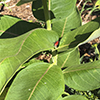 |
| Alfredo Colon 8/2 - 8/7/2019 |
Location: Woodbury, Minnesota |
 |
| Paula 7/11/2019 |
Location: 55416 |
 |
| Lucy Morrissey 7/11/2015 |
Location: Hennepin County |
 |
| Bill Reynolds 7/29/2014 |
Location: Pennington Co. Red Milkweed Beetle crawling all over the Milkweed today. |
 |
MinnesotaSeasons.com Sightings |
||

Created: 8/1/2014 Last Updated: © MinnesotaSeasons.com. All rights reserved. |
